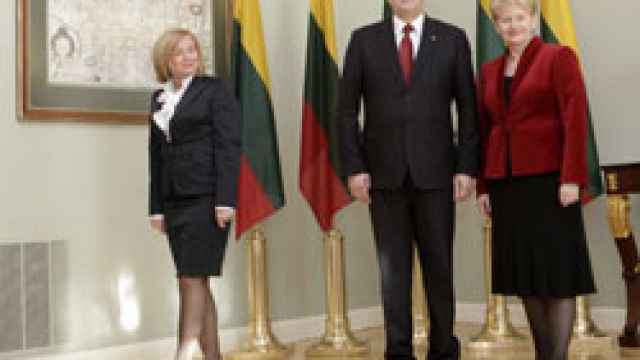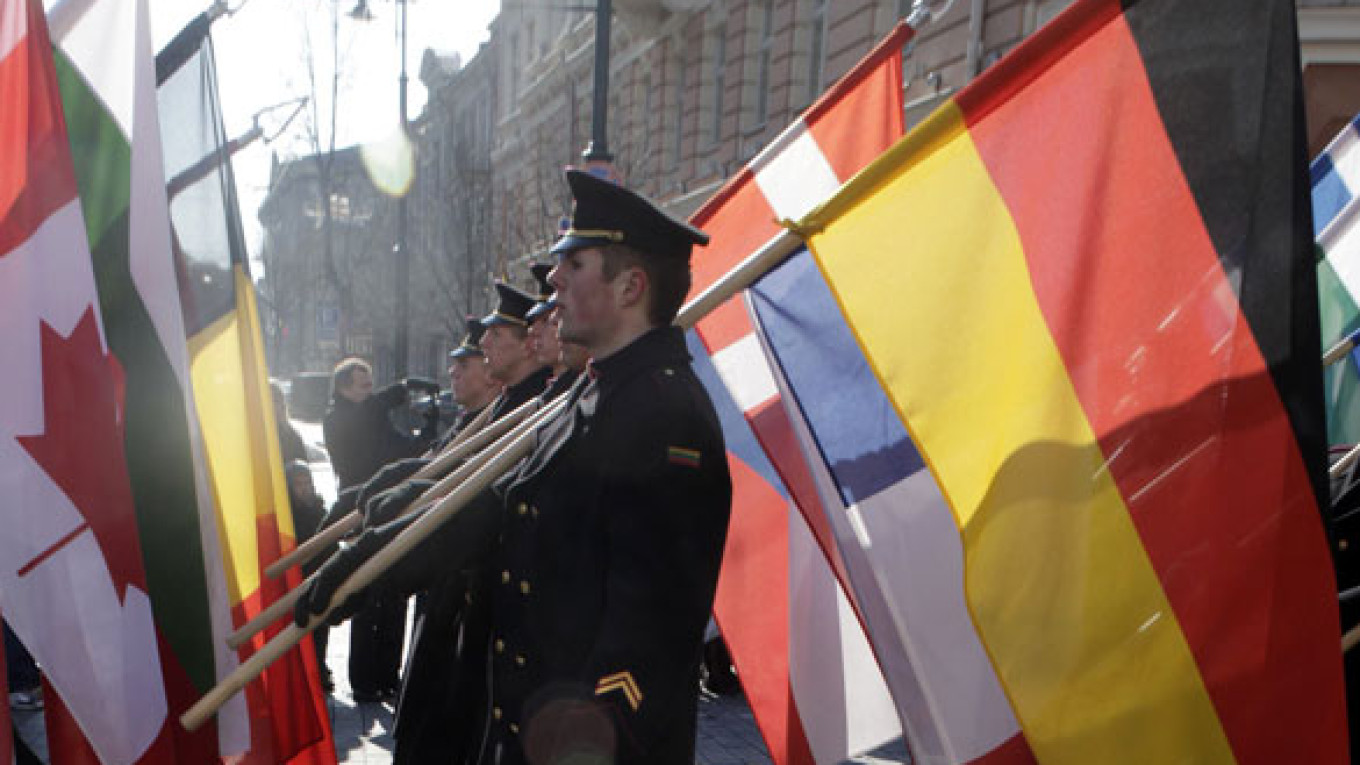VILNIUS, Lithuania — Lithuania celebrated the 20th anniversary of its declaration of independence from the Soviet Union on Thursday, recalling the seminal events that set the Baltic nation on a path to freedom and helped lead to the collapse of the U.S.S.R.
On March 11, 1990, Lithuania became the first Soviet republic to declare independence, though it only achieved its freedom more than a year later after a failed communist coup in Moscow.

Lithuania's President Dalia Grybauskaite (right), Latvia's President Valdis Zatlers (center) and First Lady Lilita Zatlere (left) posing for the media during Lithuania's independence restoration celebrations in Vilnius March 11, 2010.
"The greatest virtue we gained with our independence is a capability to create our state ourselves," President Dalia Grybauskaite said at a solemn ceremony in the parliament, where the declaration of independence was read 20 years ago.
The country of 3.4 million people was celebrating the anniversary with a military parade, concerts and fireworks. Presidents from Poland, Finland and Slovenia were among the dozens of international dignitaries attending.
President Dmitry Medvedev declined an invitation to the celebrations and sent Transportation Minister Igor Levitin to Vilnius, Lithuania's capital.
The drive for independence was not easy for Lithuania. Moscow threatened to intervene militarily, and in January 1991 Soviet paratroopers clashed with protesters at the television tower in Vilnius, killing 14 and wounding hundreds.
An aborted coup against the Soviet leader Mikhail Gorbachev in August 1991 eventually toppled the Soviet regime, leading Western countries to recognize the independence of Lithuania and its Baltic neighbors Latvia and Estonia.
From that moment, Lithuania began the lengthy process of integration with the West, culminating in membership in the European Union and NATO in 2004.
President Barack Obama hailed Lithuania's declaration of independence as a key event in returning democratic values to the former communist nations of Eastern and Central Europe.
Its split-up from the Soviet empire "became a torch of hope for nations aspiring to freedom," Obama said in a statement read by Pamela Quanrud, deputy assistant secretary of state in the Bureau of European and Eurasian Affairs.
The anniversary was bittersweet for many Lithuanians who are suffering from the deepest recession since the Soviet breakup. Only neighboring Latvia saw a steeper economic decline last year among the 27 members of the European Union.
"It is very painful and hard to say, but we must admit it: Only a handful of people enjoy the benefits of this independence. Others simply struggle to make ends meet," said Juozas Tamulis, an unemployed engineer, attending a protest rally against the government.
Grybauskaite, a former European Commissioner, urged Lithuanians not to expect too much from the government or the EU and to work hard to improve their conditions.
"If we want to make Lithuania a better place to live, we have to try harder," she said. "Everything is in our own hands."
A Message from The Moscow Times:
Dear readers,
We are facing unprecedented challenges. Russia's Prosecutor General's Office has designated The Moscow Times as an "undesirable" organization, criminalizing our work and putting our staff at risk of prosecution. This follows our earlier unjust labeling as a "foreign agent."
These actions are direct attempts to silence independent journalism in Russia. The authorities claim our work "discredits the decisions of the Russian leadership." We see things differently: we strive to provide accurate, unbiased reporting on Russia.
We, the journalists of The Moscow Times, refuse to be silenced. But to continue our work, we need your help.
Your support, no matter how small, makes a world of difference. If you can, please support us monthly starting from just $2. It's quick to set up, and every contribution makes a significant impact.
By supporting The Moscow Times, you're defending open, independent journalism in the face of repression. Thank you for standing with us.
Remind me later.


